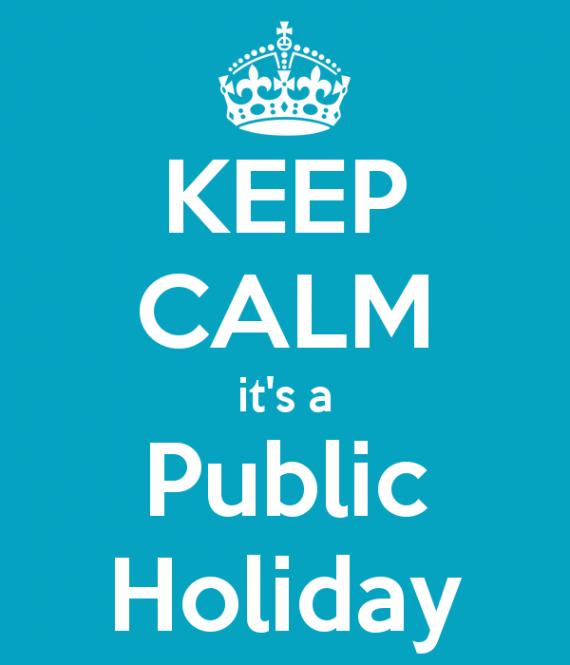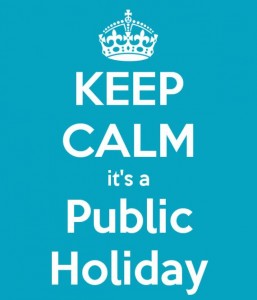This is a public holiday weekend. We use holidays to commemorate important national events. But that’s not why we have holidays. Public holidays give our calendars structure; they represent the progression of the seasons, and the regular passing of time. And they represent work-life balance.
Festivals based on the key astronomical dates go back into the mists of time. They consistently represent the solstices and the equinoxes. European festivals became holy days with the advent of Christianity. (Was the historical Jesus really born on the winter solstice? I doubt it!)
We cannot form a better basis for our holidays than the pre-Christian ‘Wheel of the Year’. It gives eight equally spaced holidays: Yule, Imbolc, Ostara, Beltane, Litha, Lammas, Mabon and Samhain. While we in New Zealand should strictly displace these festivals by six months, we live in a globalised world and just have to give new meaning, such as celebrating Yule in the summer solstice instead of winter.
The most significant of the eight have always been Yule (Christmas) and Ostara (Easter), representing in northern astronomical terms winter solstice and spring equinox. So what are our winter and spring holidays in New Zealand!? Our holidays are extremely skewed, and our post-1970s’ shame about non-work makes it almost impossible for us to systemically rethink our holidays. Indeed we only have the ones that we do have, because they were all introduced more than forty years ago.
Most of our present holidays do actually fit the Wheel of the Year. It’s just that our wheel has three missing spokes, and three adjacent spokes at that.
We could have 12 statutory public holidays, based on the Wheel of the Year, with opportunities to have multi-holiday-festivities (Christmas and Easter) and a provincial holiday.
Here goes:
For Yule we have Christmas Day, Boxing Day and New Year’s Day. (We also have January 2, Scotland’s hangover day; I don’t know why, we don’t seem to do much with bagpipes on that day.
For Imbolc we have Waitangi Day, close enough to 1 February. A really important day to reflect on our bicultural national origins; and strategically placed on the calendar, as a marker for the end of summer holidays.
For Ostara we have Easter, on or soon after the southern autumnal equinox.
For Beltane we have Anzac day, which (because Anzac Day is about death) actually fits its counterpart Samhain somewhat better. Death is generally commemorated in the northern hemisphere late in October or early in November: Halloween, Day of the Dead, All Souls, Guy Fawkes, Armistice.
Litha should be on or about 25 June. For us it is of course Matariki. Queen’s Birthday doesn’t fit; it’s too early in the winter, and it’s a pain in the bum for our second-most celebrated calendrical activity: education. While we have a whole month to celebrate Matariki, let’s move the June public holiday to the fourth Monday of June. It can be celebrated as a combination of Maori New Year, NZ Honours Day, Southern Christmas, and end of exams.
Lammas is a problem. In the north it is about the onset of harvest. Here we just need a holiday in late July in the depths of our winter. I suggest the fourth Friday of July; which could always be set as the last day of the July School holidays. School holidays are times when many people like to take annual leave. many like to take a week off in the peak of the ski season; or to go somewhere warm in the nearby tropics, or in the winterless north. (Actually, sheltered Karamea is lovely in winter.) Most workplaces are heavily disrupted anyway by all this annual leave. Let’s make it easier for parents to take leave in winter by having a statutory paid holiday within the school holidays. I am sure we can find a late July event in our history, or the birthday of a hero or heroine to name it after.
For Mabon, we have Dominion Day, 26 September. Let’s make this into a proper spring festival, and celebrate it on the last Monday in September. It would be the first day of the spring school holidays. Further, it can be a good day to reflect on our nationhood, without the specifics surrounding Waitangi Day and Anzac Day. One good theme might be the multicultural component of our national identity.
For Samhain we have Labour Day, though late October should really be our Beltane. Once a celebration of fertility, Beltane, in Presbyterian New Zealand, becomes a toned-down celebration of work-life balance.
And that takes us full wheel, back to Yule.
Let’s scrap Hangover Day (2 Jan) and Queens Birthday as public holidays. Replace these with three alternative holidays: Winter Solstice (Matariki, about June 25), Winter Break (Friday, end of July), and Spring Festival (Dominion Monday). Let our holidays reflect the symmetry of the Wheel of the Year.
We can use our public holidays to give ourselves some balanced work-life balance. Let’s have one more public holiday than the present 11, to complete the wheel. And to remind us that we work (paid and unpaid) to live; we do not live to work.







Excellent, sound thinking, and such fun.
And while we are at it, let’s move Fireworks Night to Matariki – here are some advantages:
1 It gets dark earlier, so kids can see fireworks without compromising bedtime
2 There’s much less fire risk
3 We don’t have to pretend we are not commemorating anti-Catholic violence
4 It leaves Hallowe’en unencumbered by its proximity
If the present government agrees to any public holiday changes, it will probably be to scrap the legislation that ensures extra payments for workers working on holidays.
Just to note, in NZ the meteorological year lags the astronomical year by nearly two months due to the inertial affect of so much water.
Also, Dominion Day might better be named Flag Day given likely future events as NZ is no longer a dominion.
Interesting idea!
I think that some ( but not all) statutory holidays should be moveable so people can take them when it suits them. I’m thinking particularly of people who celebrate religious festivals such as Diwali, Eid El Fitr, Chinese New year, Nowrooz etc. Our supposedly multi cultural society does not seem to consider the needs of people belonging to minority religions in NZ.
This could also provide an available work force on days when most NZers may not want to work such as during Easter.
I also think that some statutory holidays such as Waitangi Day, Anzac, New Year, possibly Christmas and Easter should be national so there are times when everyone is resting together.
We could give up celebrating a horrific overseas religiously-based monarchist execution on November 5 without loss. (And no, the invasion of Parihaka on that date should not be marked with fireworks, because the cannon on the Pūrepo {hill of the cannon} was not fired – according to oral tradition, because a dog pissed into it.)
Fireworks on the last night before daylight saving would be a good way to celebrate the coming of spring. That way the kids could see the fireworks and get to bed at a reasonable hour.
Can you fit those into your scheme?
It would make more difference to Ngāti Aotearoa than changing the flag. And did you work out what to do when the fixed-date holidays fall on a weekend? People should not miss out on a day off, two years out of seven, just because the days of our year are not divisible by seven.
Yawn, let us perhaps start to turn public holidays into real days off, also for retail and hospitality workers, and have them as family and social days, where people join together to celebrate events or do other recreational activities.
Instead we get retailers calling for opening hours on all 365 days of the year and that 24/7 kind of.
As long as we have so called public holidays being turned into what every ordinary day looks like, we should not waste too much time to speculate on how to better place holidays.
It annoys me that here in NZ media run commercial ads on Waitangi Day and many other public holidays, and all this does is feed more consumerism, and the worship of mammon.
How sick has society become where so many only use days off to go shopping and expect shop workers, most already on low pay, to slave for them and please their materialistic urges and desires.
Hogmanay is to celebrate the end of the old year – December 31 and welcome the New – January 1.
It may be that custom has changed yet January 2 wasn’t used to be a Scottish ‘hang over day’.
I’d prefer to stick with shortest and longest days for celebration – free of ‘feasts’ on dead animals and drunkenness and commercial ‘presents’.
However, the notion of potlatches is worth considering… With at least two of them being strictly non-commenrcial.
And, wouldn’t it be truly amazing if we could develop an ‘all cultures’ culture for New Zealand? Reciprocal, in fact, where we Others could do some inviting and welcoming and performing instead of the current situation. It doesn’t feel either welcoming or equal.
Comments are closed.